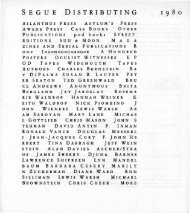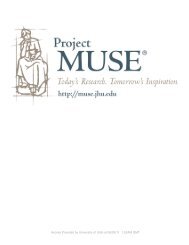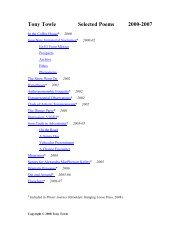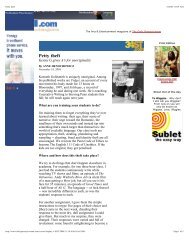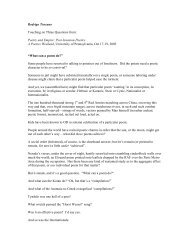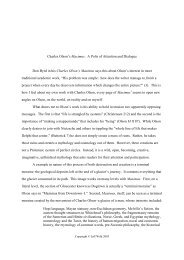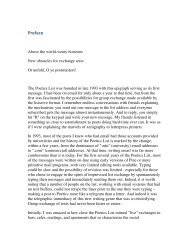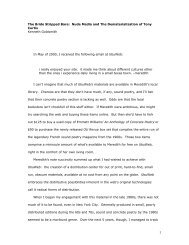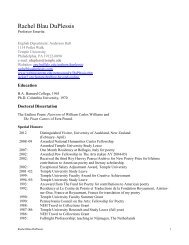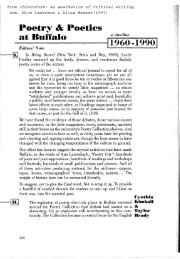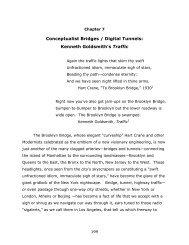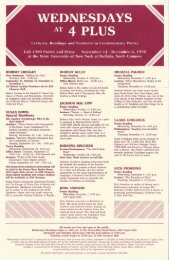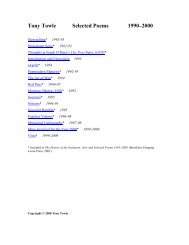P's and Q's of Poetry - Electronic Poetry Center
P's and Q's of Poetry - Electronic Poetry Center
P's and Q's of Poetry - Electronic Poetry Center
Create successful ePaper yourself
Turn your PDF publications into a flip-book with our unique Google optimized e-Paper software.
virtual,” 1 (143). Stewart sees, “the transformation <strong>of</strong> the intrapersonal (these forms in their<br />
transcendent objectivity being free, from the beginning, from an existence as ‘something<br />
DeMinter 7<br />
personal’) to the interpersonal, in that they are “objectively there” “for everyone” <strong>and</strong> hence are<br />
taken up by tradition,” in Husserl’s pure forms <strong>of</strong> communication (142).<br />
“In other words, (<strong>and</strong> other words have now become the problem),” Stewart writes, “The<br />
writing form itself comes to awaken its own familiar significations <strong>and</strong> thus take the place <strong>of</strong> an<br />
active experience with the ideality,” (143). The danger Husserl identifies here, <strong>and</strong> Stewart<br />
seems to support, is that “the originally intuitive life which creates its originality self-evident<br />
structures through activities on the basis <strong>of</strong> sense-experience very quickly <strong>and</strong> in increasing<br />
measures falls victim to the seduction <strong>of</strong> language,” (143). As a result, the personalization <strong>of</strong><br />
language impedes commutation to the point that the meanings behind expressions are no longer<br />
easily exchanged. The solution to which Stewart supports is univocity.<br />
Stewart indicates Husserl as the original proponent <strong>of</strong> univocity, citing that, “Husserl<br />
recommends not a return to the primacy <strong>and</strong> privacy <strong>of</strong> sense impressions, but a commitment to<br />
the rigors <strong>of</strong> univocity,” (143). “This occurs,” Husserl notes, “when one has a view to the<br />
univocity <strong>of</strong> linguistic expression <strong>and</strong> to securing…the results are to be univocally expressed,”<br />
(qtd. in Stewart 144). Stewart further postulates that, “the impossible balancing act <strong>of</strong> univocity<br />
is always a matter <strong>of</strong> assumed historicity, an assumed subjectivity, an assumed translatability,”<br />
(144).<br />
The balancing act <strong>of</strong> univocity insights “an anxiety regarding language’s ideal<br />
objectivity…This anxiety attaches itself to the problematic relation between subjectivity <strong>and</strong><br />
socialization, on the border between the megalomania <strong>of</strong> an inarticulate yet replete universe <strong>of</strong><br />
1 Edmund Husserl, “The Origin <strong>of</strong> Geometry,” trans. John P. Leavey, ed. David B. Allison (New York: Nicolas<br />
Hays, 1978). Original text.



